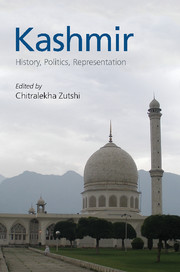Book contents
- Frontmatter
- Dedication
- Contents
- Acknowledgements
- Map 1 Pre-Partition Jammu and Kashmir
- Map 2 Contemporary Kashmir
- Introduction: New Directions in the Study of Kashmir
- PART I HISTORY
- PART II POLITICS
- 5 Azad Kashmir: Integral to India, Integrated into Pakistan, Lacking Integrity as an Autonomous Entity
- 6 ‘Not Part of Kashmir, but of the Kashmir Dispute’: The Political Predicaments of Gilgit-Baltistan
- 7 Law, Gender and Governance in Kashmir
- 8 ‘Survival Is Now Our Politics’: Kashmiri Pandit Community Identity and the Politics of Homeland
- 9 Beyond the ‘Kashmir’ Meta-Narrative: Caste, Identities and the Politics of Conflict in Jammu and Kashmir
- 10 Contested Governance, Competing Nationalisms and Disenchanted Publics: Kashmir beyond Intractability?
- PART III REPRESENTATION
- Contributors
- Index
10 - Contested Governance, Competing Nationalisms and Disenchanted Publics: Kashmir beyond Intractability?
from PART II - POLITICS
Published online by Cambridge University Press: 03 August 2019
- Frontmatter
- Dedication
- Contents
- Acknowledgements
- Map 1 Pre-Partition Jammu and Kashmir
- Map 2 Contemporary Kashmir
- Introduction: New Directions in the Study of Kashmir
- PART I HISTORY
- PART II POLITICS
- 5 Azad Kashmir: Integral to India, Integrated into Pakistan, Lacking Integrity as an Autonomous Entity
- 6 ‘Not Part of Kashmir, but of the Kashmir Dispute’: The Political Predicaments of Gilgit-Baltistan
- 7 Law, Gender and Governance in Kashmir
- 8 ‘Survival Is Now Our Politics’: Kashmiri Pandit Community Identity and the Politics of Homeland
- 9 Beyond the ‘Kashmir’ Meta-Narrative: Caste, Identities and the Politics of Conflict in Jammu and Kashmir
- 10 Contested Governance, Competing Nationalisms and Disenchanted Publics: Kashmir beyond Intractability?
- PART III REPRESENTATION
- Contributors
- Index
Summary
Introduction: Redefining resistance
For almost seven decades, peace has remained elusive in Kashmir. 27 October 2017 will mark the seventieth anniversary of the signing of the Instrument of Accession to India by Maharaja Hari Singh, the Hindu Dogra ruler of Jammu and Kashmir. It was a time when the princely state of Jammu and Kashmir could be said to be falling apart: the Poonch district on the state's western border with Pakistan had just declared independence from the Dogra rule, and after tribesmen from Pakistan's northwestern region invaded Kashmir, most of the Valley had come under their control. The Maharaja sought military assistance from India and, in return, offered to accede to India. In accepting the offer of accession under special circumstances, India's Governor-General, Lord Mountbatten, stipulated that, once the state had been freed of tribal invaders, it would be the people of the state who would decide their future political association. India's Prime Minister, Jawaharlal Nehru, was to confirm this conditional acceptance in various venues, including the Constituent Assembly of India and in Srinagar's famous Lal Chowk on 2 November 1948.
This broad framework set in motion a whole train of events. which have generated the seemingly unending turmoil in the Kashmir Valley, namely: the arrival of the Indian army in the state leading to the state's partition into the Indian-administered state of Jammu and Kashmir and Pakistan-administered Kashmir called Azad Kashmir; the January 1948 complaint by India to the UN Security Council; the January 1949 UNCIP Resolution asserting the disputed nature of the state and confirming the people's right of self-determination – which remains unfulfilled to this day; the irreconcilable positions taken by India (Kashmir as an integral part of India) and Pakistan (Kashmir as a disputed territory); and Article 370, which formally approved IJK's asymmetric constitutional relationship with India.
This background looms large in Indian Jammu Kashmir, where governance remains a matter of fierce contestation. Here different narratives of nationalism compete not only within the Valley itself, but vis-à-vis two other regions of the state – Hindu-majority Jammu and Buddhist-dominated Ladakh. Moreover, the citizenry remains disenchanted with both the chronic governmental failure to deliver on repeated promises of a good governance agenda and the perennial non-fulfilment of its identity demands. It is a place where both past events and a collective memory play significant roles, never quite effacing what came before.
- Type
- Chapter
- Information
- KashmirHistory, Politics, Representation, pp. 220 - 244Publisher: Cambridge University PressPrint publication year: 2017



